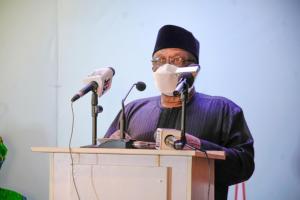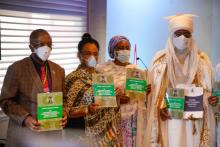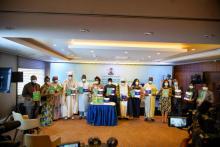Women, children, adolescents’ health takes centre stage as government launches new RMNCAEH+N platform
Abuja, 13 October, 2020 - In a bid to improve the well-being of women, children, adolescents and the elderly in Nigeria, the Minister of Health, Dr Osagie Ehanire on 12 October 2020, launched the Nigeria Reproductive, Maternal, Newborn, Child, Adolescent and Elderly Health Plus Nutrition (RMNCAEH+N), a multi-stakeholder partnership coordination platform which would harmonise the health interventions of the government and health partners to reduce wastage and channel funds to get the desired result to achieve Universal Health Care Coverage.
The platform brings together a wider cross-sector of partners and traditional leaders to address the gaps in achieving effective overall coordination of RMNCAEH+N issues by harnessing the relative strengths of individual players to leverage resources, reduce duplication and induce speed towards maximized health outcomes.
In his remarks, the Minister appreciated the leadership role of WHO and other UN agencies in the health sector in Nigeria. While extending appreciation to the health partners working in the sector, he said the launch is a renewed commitment to the partnership and coordination for the health of women, children, adolescents and the elderly in Nigeria as there have been gaps in the overall coordination of partnership and integration.
Dr Ehanire stressed the unequivocal commitment of the Federal Government of Nigeria to the attainment of Universal Health Coverage (UHC) as well as the Sustainable Development Goals (SDGs). He added that President Muhammadu Buhari is committed to improving the health and well-being of Nigerians, especially vulnerable populations, which are women, children, adolescents and elderly persons.
The present poor health indices in the country were not acceptable to the federal government and it is in the realisation of government’s vision to achieve universal health coverage, that the Federal Ministry of Health was repositioning its approach to the partnership to maximise impact for better outcomes.
He said: “Our health indices are unacceptably poor and there are emerging issues around gender, public health emergencies and, most recently, the COVID-19 pandemic. Glaring limitations in achieving equitable access to quality Reproductive, Maternal, Newborn, Child, Adolescent and Elderly Health Plus Nutrition (RMNCAEH+N) is also a key area of concern for global health and security.
Speaking at the event, the WHO Nigeria Representative (WR) Dr Walter Kazadi Mulombo appreciated the government for the commendable initiative saying he is glad to be part of the launching of Nigeria's RMNCAEH+N Multi-stakeholder partnership coordination platform as Nigeria was very instrumental to developing WHO's 13th General Programme of Work.
The WR said he was impressed by the visionary leadership of the honourable Minister of health saying if the launching can happen at the particular time in the middle of the storm of covid-19, it shows the commitment and brings about the hope that Nigeria will be among the countries who will be able to reduce women and child mortality by 2030.
Finally, Dr Mulombo appreciated the level of commitment from the governors of the states while assuring of WHO's continual support to the government, the state governors, and Nigeria's Governor's Forum to make sure that all together we meet the target and overcome based on the partnership".
Nigeria is one of the countries that have committed, under the Sustainable Development Goals (SDGs) and the U.N. Secretary-General’s Global Strategy for Women’s, Children’s and Adolescents’ Health (2016-2030), to improve the health of women, children and adolescents via transformative multi-sectoral action to accelerate coverage of interventions, reduce gender and equity gaps, and improve quality of services.
Speaking on the engagement of traditional leaders to drive attitudinal change in the communities, the Emir of Shonga, Dr Haliru Yahaya said the successes recorded from their involvement in the polio campaign and structure have shown their resilient efforts as champions getting the attention of the people in in damage and utilization health services.
We are very close to the grassroots, and we need resources for mobilisation, and we are looking forward to the development of human indices in health through the partnership among all the stakeholders, he said.
The maternal and child health indices in the country have not been faring well as Nigeria Demography and Health Survey 2018 indicates that the maternal mortality ratio is 512 per 100,000 live births; the perinatal mortality rate is 49 per 1,000 live births; neonatal mortality is 38 per 1,000 live births; infant mortality is 67 per 1,000 live births and under-5 mortality is 132 per 1,000 live births.
Technical Contacts:
Dr Ufere Joy, Email: uferej [at] who.int (uferej[at]who[dot]int); Tel: +234 803 979 5143
Owoseye Ayodamola Olufunto; Email:owoseyea [at] who.int (owoseyea[at]who[dot]int); Tel: +234 817 192 2700





